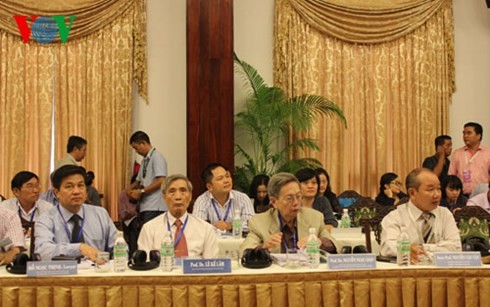(VOVworld) – An international conference entitled “The construction of artificial islands in the East Sea and its impacts on peace, security, economics, and trade development in the region” was held in Ho Chi Minh city on July 25. About 200 Vietnamese and foreign legal experts and researchers analyzed regulations of the 1982 UN Convention on the Law of the Sea (UNCLOS) relating to the construction of man-made islands in the sea, particularly the East Sea.

(photo: tuoitrenews.vn) |
The participants analyzed UNCLOS regulations, China’s construction of artificial islands in the East Sea, and possible consequences.
Reasonable safe zone
Legal issues relating to artificial islands and possible rights at sea as a result have been a matter of widespread public concern due to China’s recent activities in the East Sea. Doctor Ngo Huu Phuoc of the International Law Faculty of the Ho Chi Minh city University of Law said the construction of islands in the sea must abide by UNCLOS with respect to the freedom of navigation and aviation, marine environmental protection, and oceanic research. He said an artificial island has neither territorial waters nor a contiguous zone, an exclusive economic zone, or a continental shelf.
Professor Doctor Erik Franckx, a member of the Permanent Court of Arbitration in The Hague, said the 1982 UNCLOS specifies that artificial islands have rational safety zones, normally not larger than 500 m from the island’s edge. The jurisdiction within the safety zone must respect international navigation activities, Franckx said: “The 1982 UNCLOS defines that we are not allowed to change the status quo to affect the environment. In nature there are rocks, shoals, and islands that we are not allowed to change the status quo because it violates international on natural exploration. The construction of artificial islands will not lead to new rights and artificial islands have to abide by international law.”

Participants at the conference |
Negative impacts
Professor Doctor Mai Hong Quy, Rector of the HCM city University of Law, said China has no right to build artificial islands in Truong Sa archipelago. He pointed to the fact that China used force to attack and occupy some rocks in Truong Sa archipelago, which is under Vietnam’s sovereignty. He said international law doesn’t acknowledge a nation’s sovereignty over a territory it gained by force. China’s construction of artificial islands in Truong Sa, therefore, he said goes against international law, particularly the 1982 UNCLOS.
China’s massive construction to turn illegally occupied rocks in Truong Sa into artificial islands has obstructed freedom of navigation and aviation and international trade. To protect the illegally-built islands, China has established an area of 12 nautical miles around the artificial islands and banned foreign ships and planes from traveling through the area. Lawyer Dang Van Minh, Deputy Head of the Lawyers’ Association of District 11, HCM city, says: “China wants to turn undisputed areas into disputed areas and submerged islands into islands. China has claimed sovereignty over these islands to realize its “U-shaped” line. Vietnam and the G7 nations, including the US, oppose China’s activities. The construction of the artificial islands has violated Vietnam’s sovereignty, sovereign rights, and jurisdiction.”
China’s construction of artificial islands in the East Sea has negatively impacted the local marine environment, ecology, and marine biodiversity. Doctor Pham Van Vo, Deputy Head of the Trade Law Faculty of the HCM city University of Law said China’s construction infringes international environmental law. It contradicts principle 2 of the Stockholm Declaration and regulation 7 of the Rio De Janeiro Declaration on environment and development.
The destruction of coral reefs violates the environmental protections in Article 192 and 193 of UNCLOS.
Professor Doctor Jay Batongbaca, Director of the Philippine’s Marine Relations and Sea Law Institute, said China’s island reclamation in the East Sea has had a huge impact on the marine environment and poses a direct challenge to resolving disputes in the East Sea.